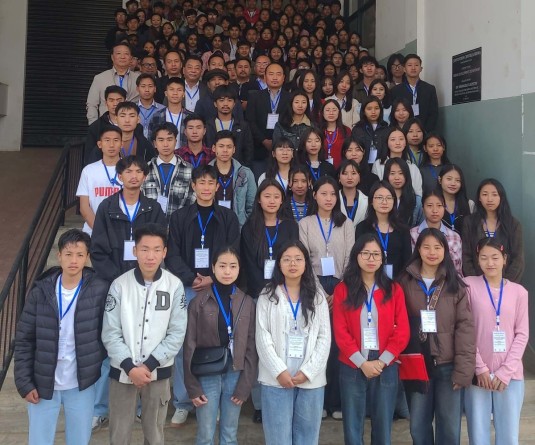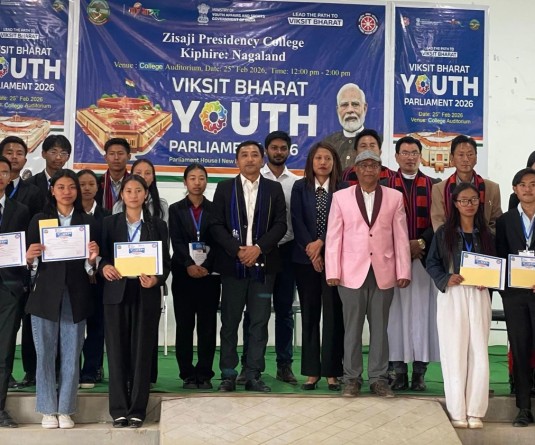
Kohima, May 4 (MExN): As part of part of its initiative to sensitize teachers about the issues of people and especially children with special needs, Enable visited Baptist Higher Secondary School and Chandmari Higher Secondary School on April 28 and 29 last.
“…schools need to adopt and create methods to facilitate learning for the special child”
The resource persons for both the programmes were Kopelo Mero, special educator and former consultant of FIVE Centre, Chennai and Shree Ram School New Delhi. The visits was part of Enable’s ongoing programme to help schools in Nagaland to accommodate special children in the regular school set up and initiate inclusive education in its true spirit. About 50 teachers in both the schools participated in the programme.
Interacting with the teachers, Kopele highlighted that there are different types of disabilities and those which affect the physical being of a persons often get more attention. However she added that there are other less obvious types like learning disabilities that often go undetected. Many children who suffer from learning difficulties like Dyslexia can have very difficult times in the schools with teachers labeling them to be lazy or naughty while they may be having a severe concern. Therefore emphasizing on creating awareness and sensitizing society, Kopele opined that schools need to adopt and create methods to facilitate learning for the special child and the class as a whole. The need for parents and society to accept the situation of such children was a must, she said.
Explaining further, Kopele cited restlessness, laziness, inattentiveness, unresponsiveness as some of the behavioral aspects that were usually off as that of an errant child but these were things that needs a further looking into. She also added that teachers should be on the lookout for other pointers like poor spelling, speech impairments, and difficulties in peer interaction and in solving problems. She added that identifying such a child would lessen the stress for both teacher and pupil and that ‘common sense’ was the most powerful tool for a teacher.
Some of the methods the resource person shared were to monitor teasing by other students as this was harmful in the long run, to show appreciation to the pupil, render positive teacher comments, add fun factor in the class, adapt teaching according to the need of the class and ‘be interesting”- a catchword for all teachers. The visits to the schools also brought about positive interactions with the teachers that helped them to better understand the needs of such children in their classrooms. Meanwhile, Enable plans to visit more schools in Kohima as well as other parts of the state to continue in their effort to create a society more conducive for special people, said Neikule Doulo, chairperson, Enable.
“…schools need to adopt and create methods to facilitate learning for the special child”
The resource persons for both the programmes were Kopelo Mero, special educator and former consultant of FIVE Centre, Chennai and Shree Ram School New Delhi. The visits was part of Enable’s ongoing programme to help schools in Nagaland to accommodate special children in the regular school set up and initiate inclusive education in its true spirit. About 50 teachers in both the schools participated in the programme.
Interacting with the teachers, Kopele highlighted that there are different types of disabilities and those which affect the physical being of a persons often get more attention. However she added that there are other less obvious types like learning disabilities that often go undetected. Many children who suffer from learning difficulties like Dyslexia can have very difficult times in the schools with teachers labeling them to be lazy or naughty while they may be having a severe concern. Therefore emphasizing on creating awareness and sensitizing society, Kopele opined that schools need to adopt and create methods to facilitate learning for the special child and the class as a whole. The need for parents and society to accept the situation of such children was a must, she said.
Explaining further, Kopele cited restlessness, laziness, inattentiveness, unresponsiveness as some of the behavioral aspects that were usually off as that of an errant child but these were things that needs a further looking into. She also added that teachers should be on the lookout for other pointers like poor spelling, speech impairments, and difficulties in peer interaction and in solving problems. She added that identifying such a child would lessen the stress for both teacher and pupil and that ‘common sense’ was the most powerful tool for a teacher.
Some of the methods the resource person shared were to monitor teasing by other students as this was harmful in the long run, to show appreciation to the pupil, render positive teacher comments, add fun factor in the class, adapt teaching according to the need of the class and ‘be interesting”- a catchword for all teachers. The visits to the schools also brought about positive interactions with the teachers that helped them to better understand the needs of such children in their classrooms. Meanwhile, Enable plans to visit more schools in Kohima as well as other parts of the state to continue in their effort to create a society more conducive for special people, said Neikule Doulo, chairperson, Enable.






